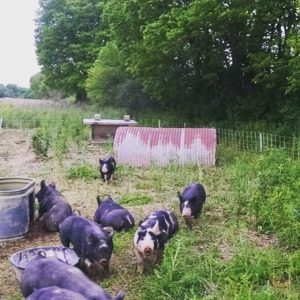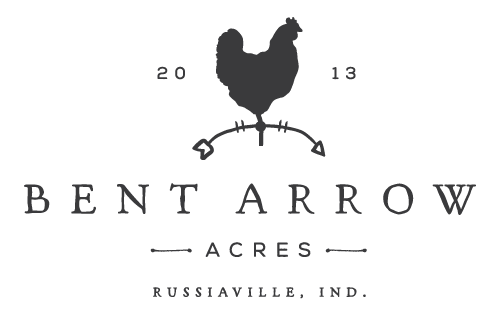26 Jul Pork Week Day 2: Finding a Farmer and a Pig
Before you get too excited about cuts of meat and all the cooking you can do with a freezer full of pork, you have to find it. Sometimes this is easy. But, for some people this may be hard. And, you might have particular needs or wants about the pig you purchase.
Below are our tips for finding the pig best for you and your family and the questions you should ask along the way.

Finding a Farmer:
Unless you live in a rural area, it might be hard to find a pig farmer. And, depending on where you live, you may not know a farmer. Period. (I didn’t growing up!)
Where To Look:
- Visit a Farmer’s Market. This will help introduce you to farmer in your area or at least within a short drive. Talk with the farmer’s even if they are not selling pork. They may raise pigs and just not bring them to market for a handful of reasons such as, they only sell them half or whole or there may be stipulations at the market where there can only be one pork vendor and the slot was already full. They may also know of a neighbor or farmer friend that they can get you in touch with. Also know that every Farmer’s Market has a Market Master, or leader. They are very clued in on the local food scene and who in the area produces what. They are great resource.
- eatwild.com is a great website. (We still need to apply to get on it…) But, I have used it for beef and lamb in the past. They share a quick blurb and contact information about pasture raised animals by state.
- Your state’s Department of Agriculture and/or County Extension office are also great places to ask for references to local farms.
What To Ask:
- How are the pigs raised? Are they on pasture or are they in a barn or pen? How much time do they spend outdoors?
- We have found that pasture raised meat is much tastier than that of pigs raised inside; not to mention, more humane. Pigs are meant to move around, play in mud and root for snacks. They also can tear up a pasture very quickly, so ask about their management. If you are told that they only have “access” to the outdoors, be wary and ask more.
- Are the pigs born on the farm? If not, where are they from?
- Helps you understand the background of the animal. No answer is right or wrong. It’s great to have pigs born on a sustainable farm, but many farmer’s do buy piglets to raise.
- What do the pigs eat? Are the hogs given antibiotics?
- Even on pasture, pigs will likely have feed available. This is good because it will help them get a balance of minerals and develop a good meat-to-fat ratio. The feed might be different where ever you go, so ask what is in it. Some feed is non-GMO, sometimes it is organic. There may be additives. Some consumers prefer to eat meat that has never received antibiotics while some are okay with the use of antibiotics if the animal does get sick. This is a good time to ask about these things if it matters to you. Know that by law, hormones cannot be given to pigs and continual use of antibiotics to promote growth or ward of disease is considered unsustainable.
- How old are the pigs when they are processed? How big are the pigs when they are processed?
- First, don’t be alarmed by the word “processed.” It gets a bad rep because of highly processed convenience foods; but, in this context, processing is natural, necessary and it is simply the butchering of the animal. Bacon or ham is not bacon or ham without curing and smoking. Know that older pigs have more fat which makes these items really good and knowing the size will help you prepare for when the meat arrives to your home.
- What is the price per pound?
- This can vary greatly depending on the breed, manner in which is was raised, and other production elements like if processing is included.
- How and where are the animals processed? Is it included in the price?
- Some places may actually sell you the live animal versus a processed animal. It might be up to you to line up the butchering. Other farms might include the processing. They may do it themselves or they may have a separate processor. No matter what, look for a processor that is USDA certified and inspected.
- What cuts of meat can I receive with my purchase?
- Most farms or processing facilities should have cut sheets where customers select the cuts they want. Feel free to ask about specifics. We have had questions about lard and if the pig can be kept whole.
- When will the pigs be available?
- This will help you plan. Be advised that you are working with living beings and Mother Nature. An estimate timeline is the best you can expect; but, understand the process of pick up and when you might need to be available to get your hog from the farm.
- Can I come see the pigs? Can I pick my pig?
- If it matters to you, ask it! They just might let you. It’s a great way to see how they are raised and it’s fun to have your family understand where their food comes from!
- Why do you raise pigs?
- I love this question because you get to know the farmer a bit. It may be in their family. They may be because they are really passionate about great food. They may want to provide the best care to the animals and the land. It will make for a neat conversation.
We will do a post later this week all about our hogs, but feel free to ask any questions if you have them!



Sorry, the comment form is closed at this time.